MINA News Agency Reporters Team conducted an exclusive interview with Dr. Mohamad Hery Saripudin, M.A., who is appointed as Ambassador Extraordinary and Plenipotentiary of the Republic of Indonesia (LBBP RI) to the Republic of Kenya concurrently as the Democratic Republic of Congo, Federal Republic of Somalia, and Republic of Uganda.
Apart of the ambassadors in the four East African countries, Ambassador Hery is also appointed as the Permanent Representative of the Republic of Indonesia in the United Nations Environmental Program (UNEP) and the United Nations Human Settlements Program (UN-Habitat) based in Nairobi, Kenya.
MINA News Agency’s Reporters Team consists of Senior Editor Widi Kusnadi, Chief Reporter Rana Setiawan, and Head of Arabic Desk Rifa Berliana Arifin.
In an interview in Jakarta on Sunday (September 9), Ambassador Hery stated that he is ready to take on the task of focusing on economic diplomacy which is being intensively carried out by the government.
Also Read: Strengthening Bridges of Friendship and Cooperation between Indonesia and African Countries
According to him, the potential for cooperation, especially in the economic sector between Indonesia and each accredited country is very large.
In addition, Ambassador Hery said that this multilateral diplomacy can also be a means to improve economic diplomacy.
Dr. Mohamad Hery Saripudin, M.A. was inaugurated as ambassador along with 20 other ambassadors on September 14, 2020 at the State Palace in Jakarta by the President of the Republic of Indonesia Joko Widodo.
The appointment of all ambassadors is contained in the Decree of the President of the Republic of Indonesia Number 91 / P of 2020 dated 11 September 2020, 92 / P and 93 / P of 2020 dated 14 September 2020 concerning the Appointment of Ambassador Extraordinary and Plenipotentiary of the Republic of Indonesia.
The 57-year-old Indramayu-born man previously served as a diplomat in South Africa, Canada, United States, and most recently as the Indonesian Consul General in Jeddah, Saudi Arabia.
The glassesy man who passed from SMAN Indramayu year of ’81 and alumnus of International Relation department of Gadjah Mada University (UGM) had served as Director for the Center of Policy Analysis and Development on Asia-Pacific and African Affairs and Policy Development for Asia-Pacific and Africa) Ministry of Foreign Affairs of the Republic of Indonesia.
When he was the Indonesian Consul General in Jeddah, Ambassador Hery received the Primaduta Award in three consecutive years (2015-2017). He received a doctorate in International Relations from the Faculty of Social and Political Sciences (FISIP) Padjajaran University (UNPAD) in 2018.
During his duty, Ambassador Hery will be based in Nairobi, Kenya.
Also Read: Ambassador: Climate Change is the Main Cause of Floods in Pakistan
The following is the interview:
MINA: What are your priority tasks as Ambassador and the Permanent Representative domiciled in Nairobi?
Ambassador Hery: Okay, before describing priority tasks. I want to describe my portfolio first. I was appointed the Indonesian LBBP Ambassador to the Republic of Kenya and concurrently with the Democratic Republic of the Congo, the Federal Republic of Somalia, and the Republic of Uganda. This is bilateral.
Besides that, I was also appointed as the Permanent Representative of the Republic of Indonesia in the United Nations Environmental Program (UNEP) and the United Nations Human Settlements Program (UN-Habitat) based in Nairobi, Kenya.
In the diplomatic world, the Indonesian Government currently has 132 representatives consisting of 95 Embassies, three Permanent Mission to the United Nations in New York, Geneva and Nairobi, as well as the Permanent Mission to ASEAN in Jakarta, 30 Consulates Generals and four Consulates.
So, there are three types of representation.
First, the most popular, the Embassy of the Republic of Indonesia which is led by an Ambassador is bilateral in nature with accredited countries, covering all aspects of cooperation, from political cooperation, economic security, social, cultural, community protection and so on. Second, the KJRI (Consulate General of the Republic of Indonesia) is led by a Consul General, the working area and substance of the portfolio are limited, only the scope of the economy, social, culture and community protection, may not handle politics and security. The working area is not all accredited countries.
For example, the Indonesian Embassy in Riyadh works in charge of the entire territory of the country of Saudi Arabia. Meanwhile, the Indonesian Consulate General in Jeddah only covers 7 provinces out of 13 provinces in Saudi Arabia, namely the Provinces of Mecca, Medina, Najrah, Jizan, Asir, Tabuk and Al-Baha. So in the political field cooperation is the responsibility of the Ambassador, therefore the Consul General must coordinate with the Ambassador. Even though they both have the same independent authority. The Indonesian Embassy and the Consulate General are also the same in appointing the Ambassador and Consulate General based on the Presidential Decree.
Also Read: AMBASSADOR TALKS/Russian Ambassador: Attack on Ukraine Tough Choice to Make
Then the third, PTRI (Permanent Mission of the Republic of Indonesia) handles multilateral cooperation led by the Permanent Representative of the Republic of Indonesia with the title of the Ambassador, calling him a Permanent Representative. It should be noted that the UN has four main offices, according to its ranking of magnitudes, namely the United Nations office in New York, United States, as the main headquarters of the world body, where the main UN agencies, such as the General Assembly and the Security Council, handle politics and security. The two UN offices in Geneva, Switzerland, which handle human rights, social cultural and legal issues.
Now, the third is actually in Nairobi, Kenya, which is the third largest UN headquarters after New York and Geneva, dealing with environmental and urban planning issues, increasing slum settlements, including the issue of climate change. Furthermore, the four UN offices in Vienna, Austria, which handle nuclear issues are home to the International Atomic Energy Agency (IAEA).
Formally, the largest index (weight for a person assigned to the Ministry of Foreign Affairs of the Republic of Indonesia). My task is in multilateral cooperation as the Indonesian Vice President at UNEP and the UN-Habitat based in Nairobi. The trial is held every week. The work of this multilateral diplomacy portfolio is norm-setting, compiling rules, norms and so on. Its activities are mainly about formulating world rules. Many of his activities are attending sessions, debating arguments, and so on.
So those who implement the world rules during this bilateral activity.
Also Read: Palestinian Administrative Detainees Boycott Occupation Courts for 40th Consecutive Day
Indonesia itself has a good profile in UNEP and UN-Habitat agencies. On the UN-Habitat agenda next October, the City of Surabaya will host the World Habitat Day 2020 Commemoration. The commemoration will be held on 15 October 2020.
This year, the Mayor of Surabaya, Tri Rismaharini, received an award from the United Nations Human Settlement program (UN Habitat). As a role model for mayors worldwide in the management of environmentally friendly cities, smart cities, and so on.
Within the framework of UNEP activities, there is a ministerial level meeting every two years. The Minister of Environment and Forestry is always active in this trial. At the 4th United Nations Environment Assembly (UNEA-4) last year, Indonesia initiated five of the 23 agreed resolutions.
The five resolutions are related to sustainable consumption and production (SCP), sustainable management of peatlands, preservation of mangroves, protection of the marine environment, and sustainable management of coral reefs. Through these five resolutions, the Indonesian delegation tried to invite the global community to work together in supporting Indonesian initiatives.
Also Read: Interview with Pakistani Ambassador to Indonesia: Kashmir Solidarity Day
Well, even if the index is bigger there. But we must contextually follow the President’s (Jokowi) instructions which must focus on economic diplomacy.
So multilateral cooperation does not mean there is no economic diplomacy either. How do we create norms, rules, and so on that can direct the ease of carrying out trade or the ease with which our business actors enter the world market.
For example, I have an idea, although I have not coordinated with related parties, namely regarding the issue of oil palm. In general, black campaigns and attacks against the Indonesian oil palm plantation industry have been intensively carried out in both Europe and America.
Meanwhile, in Africa and the Middle East the black campaign has not spread too much. There are various negative issues or black campaigns, starting from the fact that palm oil is not environmentally friendly, palm oil is not friendly to health, and all kinds of things. I thought, my idea is to offer a draft resolution that this palm oil is environmentally friendly, this palm oil employs MSMEs, small people, and this palm oil does not harm health.
Also Read: Khaled Meshaal to MINA: Indonesia is at the Forefront of Those Who Support Palestinian Cause
We believe that this is business competition. Indonesia is one of the largest producers and exporters of crude palm oil (CPO) in the world. Apart from being used as raw material for the food sector, it can also be used as raw material for making renewable energy or the trend known as biodiesel.
This is also one of the most influencing factors causing the high demand for palm oil in the world market. However, in international trade, consumers who choose to buy CPO are sensitive to various negative issues or black campaigns.
So, this is one example of multilateral diplomacy, which is an opportunity to prepare a legal infrastructure towards increasing economic diplomacy.
As directed by President Jokowi, asking 70-80 percent of my duties to focus on economic diplomacy. During my time as ambassador in Nairobi. My vision is to make the Indonesian Embassy in Nairobi an effective and authoritative Indonesian diplomacy machine in the Indonesian Embassy working area there.
Also Read: Ambassador: Many Opportunities on Relationship Between Indonesia-UAE
The mission that will be carried out while on duty later is actually the same as the mission conveyed by the Indonesian Foreign Minister, focused on five missions Indonesian diplomacy which is carried out based on 4 + 1 priorities, namely: strengthening economic diplomacy; protection diplomacy; sovereignty and national diplomacy; and Indonesia’s role in the region and globally. Meanwhile, the one plus is the strengthening of the diplomatic infrastructure.
I have a mission to promote economic diplomacy, make the Indonesian Embassy (Nairobi) a common home for Indonesian citizens of the diaspora there, protect the Republic of Indonesia, actively show leadership in international forums, and strengthen the diplomatic infrastructure.
Then what is the diplomacy machine, the human resources, the infrastructure not only in buildings but also how the communication equipment and technological sophistication in our diplomatic means, as well as in an effective budget.
Ambassador Dr. Mohamad Hery Saripudin, M.A. (second from right) after an exclusive interview with the MINA News Agency reporter team, Sunday (20/9) Photo: Doc. MINA)
Also Read: Exclusive Interview with Indonesian Ambassador to Afghanistan
MINA: Then, How do you view Africa as the focus of Indonesia’s economic diplomacy?
Ambassador Hery: Back to priorities. So, this economic diplomacy is the main thing is economic promotion. Why is economic diplomacy important in Africa.
If we refer to the Foreign Minister’s statement, you can see her digital track record, she once said that when we talk about promoting economic diplomacy the focus is on Africa.
The Foreign Minister at that time used the term in English “Africa will be the main theater of Indonesia’s economic diplomacy.” Why for one reason, according to International Financial Institutions (IFIs), Africa is The Next Asia. If we take the cycle per century. The previous century was the Trans-Atlantic Century, then the Pacific Century, and then the African Century. God knows, nature, this is also a prediction. But I believe in it because I see from various aspects Africa has tremendous natural resources, rich in minerals and oil, and it has not been optimally exploited.
Second, I believe that the potential for cooperation, especially in the economic sector between RI and each accredited country is very large. We need to fully utilize this potential to support efforts to increase economic diplomacy.
There are world economic analysts who say, who controls Africa today, they will control the future. Evidence, currently nearly 70 percent of African countries have close relations with China in the economic field. Including the accredited countries where I will work later. Because China knows very well, 25 years ago China entered into economic expansion into African countries.
In fact, Indonesia and Africa have a close and very important relationship, starting from the Asian-African Conference (KAA) in Bandung in 1955. This is actually a historical asset.
If we talk about Indonesia in African countries, especially African countries that were present at the 1955 KAA, Indonesia is a hero for them. Because through the Bandung Spirit, it gave the African countries enthusiasm against imperialism and colonialism.
Currently, China, Japan, and Vietnam are aggressively expanding their economies in Africa. China itself has the China-Africa Cooperation Forum (FOCAC), presenting China’s aid and investment strategy in Africa.
Indonesia itself has only seriously intensified economic diplomacy with Africa since two years ago. It was marked by the implementation of the Indonesia-Africa Forum (IAF) which took place in April 2018 and as a follow-up the Indonesia-Africa Infrastructure Dialogue was held in August 2019.
This is a challenge for us because of the perception that many do not know about the enormous potential for cooperation between Indonesia and African countries, especially in the economic and socio-cultural fields.
We have enormous assets, not only historical assets, but political assets, demographic assets and geographic assets. I can explain at length how important Indonesia is to Africa.
But instead we must first understand the importance of Africa to us. This is the responsibility of all of us. The responsibility of the media, the responsibility of MINA how to become a public awareness campaign that Africa is the focus of our economic diplomacy.
I want to make the media a strategic partner for the implementation of work during my tenure there.
MINA: How will the economic diplomacy strategy be implemented?
Ambassador Hery: The first step that I want to prioritize from the aspect of my government will be to continue efforts to encourage accreditation countries, particularly the four countries where I work, to enter into a Free Trade Area (FTA) agreement. If the tariff cannot be reached o percent, at least the selected tariff. So, we go to be the selected item first.
Second, when we talk about cooperation with African countries, the obstacle is one namely regarding financing. I have communicated with our Exim Bank, which is ready to participate in funding cooperation, especially for our MSMEs who have enthusiasm in penetrating the African market. There are many forms, such as export credit and so on.
Apart from that, I was also instructed to oversee large state-owned companies making outbound investment or investment abroad, which currently for Indonesia is no longer taboo. Outbound investment is the second class generation after trade.
In the last two years, state-owned companies have entered Africa. PT INKA (Persero) is working on a large-scale project in the Democratic Republic of Congo in the form of work on trains, freight trains, including electric trains (KRL). Not only in Kinsasa but also in the northern region of Congo which borders Uganda in the form of mines and the southern region bordering Zambia.
In addition, PT Len Industry has also entered Africa, playing a role in the installation and procurement of signaling materials, telecommunications, substation (power), SCADA, automatic fare controllers, and portable sliding doors for railways.
Meanwhile in the aviation sector, Merpati Nusantara Airlines has collaborated with several airlines in Africa, particularly Congo, to open Indonesian-African cargo routes.
We, as ambassadors there will later participate in overseeing the implementation of this cooperation.
In fact, Indonesia has a positive image in the eyes of the East African people, so that it is also an important asset for Indonesia’s economic diplomacy.
Indonesia joins the peacekeeping force in Congo. The peacekeeping force of the Garuda Contingent TNI has a good image in the eyes of the local community because of their hospitality and enthusiasm for maintaining peace.
Through them, products from PT Pindad (Persero) ranging from weapons to ranpur production, such as the Anoa partner used by our peacekeepers. This is an effective means of promotion. It is not only known by the local state but also by a combination of the countries that send their troops. If the strategic defense weaponry used by our troops shows sophistication, then many countries will certainly be interested.
So, I want to explore various ways and strategies that ultimately lead to increasing economic diplomacy.
MINA: Then what about cultural cooperation?
Ambassador Hery: I will also pay attention to educational and cultural cooperation. I have spoken with two chancellors who are committed to working together to provide scholarships to African students. Because I asked. I conveyed to the two chancellors that we provide this scholarship with a very strategic political investment.
We invite them to study here, what is a scholarship for S1, S2, S3. Imagine if these children came home to be leaders, government policy makers. When he returned there, the culture was already leaning towards Indonesia. So, when they become leaders in weighing decisions, they will lean towards Indonesia.
MINA: Considering the security risks in the countries where you work, how do you view this?
Ambassador Hery: Security is very important while on duty. Therefore, it becomes a special concern when starting work later.
Security is like oxygen. If we were in a safe area, it didn’t seem as important. But when we are in an unsafe zone, it is very valuable.
For embassies and guest houses, the usual security protocols are applied. That is the maximum effort, but if it turns out that it is like that, it will still be exposed to danger as well, that’s called fate. Therefore, we have to pray a lot and tawakkal (surrender) to Allah.
MINA: Can you explain the importance of the countries where you work for Indonesia, including strengthening Indonesia’s position in Africa and international forums?
Ambassador Hery: Kenya has a port called Mombasa as a port city. Mombasa as the largest port on the east coast of Africa. As the second largest city in Kenya, its economic activity is of course very high.
Nairobi as the capital of Kenya has developed into the largest city in East Africa with an area of 684 km2. The population reaches 4-5 million people. Nairobi has also developed as a hub city for neighboring landlocked countries (Uganda, Burundi, Rwanda, and southern Sudan).
Not only for land transportation routes but also as a business center because of the many global companies that open offices for the East Africa and Africa region in this city.
Nairobi is also the only developing country to host the headquarters of UN agencies, namely the United Nations Environment Program (UNEP) and the United Nations Settlement Program (UN-Habitat).
For the East African Regional Community (EAC) which consists of Tanzania, Kenya, Burundi, Uganda and Rwanda, Kenya is classified as a “giant” in almost all fields, including in area, population, economy, infrastructure, as well as international communication and transportation routes.
If we talk about Africa, especially sub-Saharan, there are only three countries that need to be considered by Indonesia, namely Nigeria, South Africa and Kenya. For Kenya, East Africa is relatively the most advanced in terms of both legal and physical infrastructure. For example, Indomie producers are one of the most successful Indonesian companies in the African continent. Indofood opens factories in Africa, one of which is in Kenya.
The World Bank’s East Africa headquarters is in Nairobi Kenya. Apple’s headquarters for Africa is in Nairobi Kenya.
The development of Islam there is also quite good.
Democratic Republic of the Congo (DRC), which was previously known as Zaire until 1997, is a country located in the Central African Region. DRC is the second largest country in Africa and the 11th largest in the world, covering an area of 2,345,409 km2, with the capital city Kinshasha.
Cooperation between the two countries in the international is also well established. The DRC government has expressed its support for Indonesia’s nomination as a Non-Permanent Member of the UN Security Council for the 2019 – 2020 period. By means of a mutual support scheme with the DRC candidacy as a member of the Human Rights Council for the period 2018 – 2020.
Indonesia is already there. In addition, the number of Indonesian citizens living in RDK in early 2019 has reached 1,115 people. Most of them are members of the Indonesian Army who are members of MONUSCO, plus a small proportion of civilians who work, especially in the mining sector.
While Uganda has an area of 241,038 km2, with a total population in 2018 reaching 42.72 million people. The majority of the population is Muslim. It is a potential market. Several Indonesian products have entered there.
In the field of education, during the 2008-2017 period, Indonesia has provided Developing Countries Partnership (KNB) scholarships to 37 Ugandan citizens. In addition, from 1999 to 2017, Indonesia has provided training to 13 Ugandan participants, including diplomatic training, irrigation systems, fisheries and the peace support operation course (PSO).
There is already the Uganda Indonesia Friendship Association (Uginfa) which has established alumni of Ugandan citizens who receive scholarships in Indonesia. In fact, there are alumni who have become immigration officials, the same is true in Somalia.
Meanwhile in Somalia itself, in Jakarta itself there are several Somali businessmen who have been here since 1998. They have businesses here. They admit that every month they have exported hundreds of thousands of dollars, even up to US$1 million. We are always in surplus because we have never imported from Somalia. We export there, from textile products such as sarongs, soap. I once met Somali diplomats who were in Jakarta.
The strategic meaning, I am optimistic that these four countries will become target markets for improving Indonesia’s economic diplomacy.
The problem is how our entrepreneurs need to be encouraged to be attracted to the African market.
In my first 100 days on duty, I also plan to open the Indonesian Products Home, as a bridge for superior small and medium enterprises products to enter the African market. I also want to encourage the presence of an Indonesian Economic and Trade Office there, which currently doesn’t exist.
MINA: What is your message for Indonesian entrepreneurs to support economic diplomacy in Africa?
Ambassador Hery: The greater the risk we imagine, the greater the benefits we get. If a businessman who is tough, who is true, is usually not afraid of risks, of course calculating the risks is not desperate.
Usually, leaders will get a much bigger profit than followers, because they have mastered it first, so don’t become followers and become leaders.
And my promise as ambassador for at least the next three years I will facilitate as much as I can, and my commitment will be to fully assist entrepreneurs. It is time for red and white to fly in East Africa. (T/RE1)
Mi’raj News Agency (MINA)






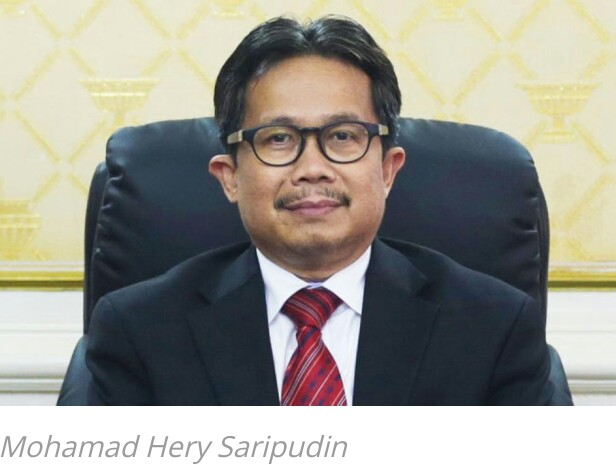

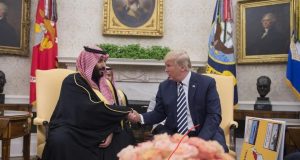

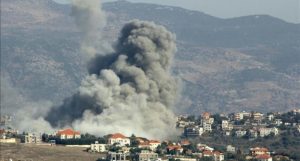
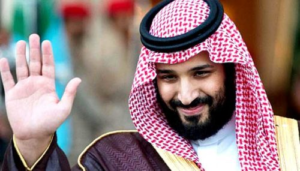
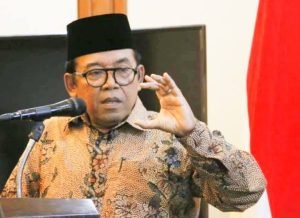
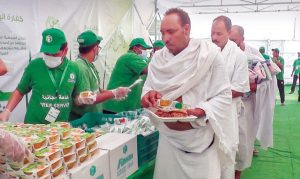

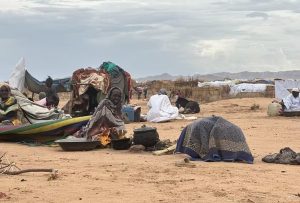
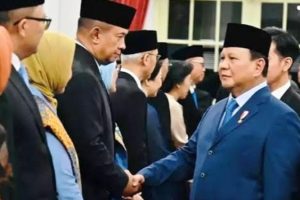

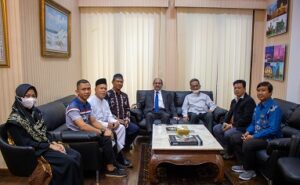
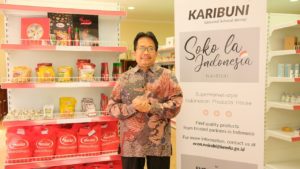
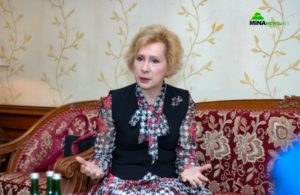
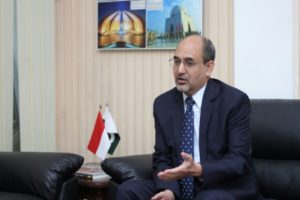











 Mina Indonesia
Mina Indonesia Mina Arabic
Mina Arabic